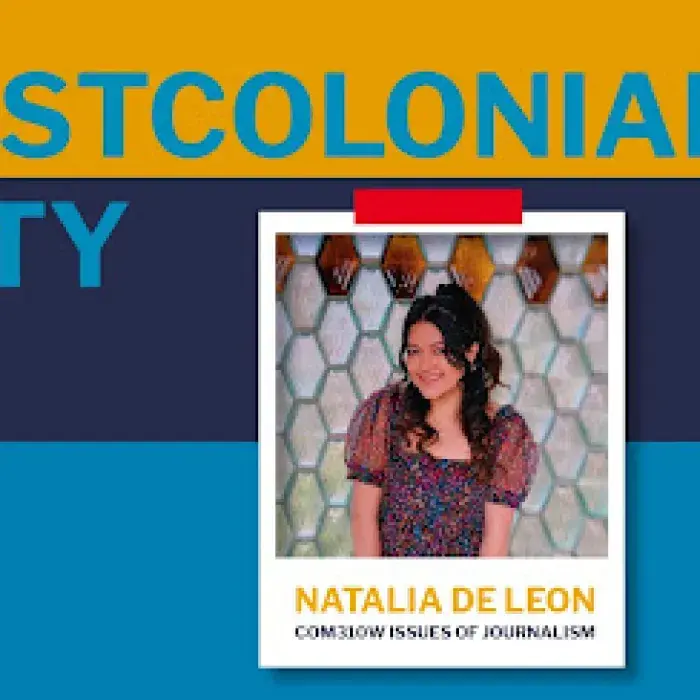The Postcolonial Identity
Growing up in Guatemala, I never realized the postcolonial environment that surrounded me until I left for university. My postcolonial identity permeated unto little things. When a friend was proofreading an essay of mine, she brought to my attention that I had not capitalized the word "Indigenous." It did not come from any sort of malicious intent. However, I am proof that little things like that are so subconsciously in your head as an effect of being raised in a postcolonial environment with a privileged postcolonial identity. "The distance enables us to actually more clearly see how our countries operate," says Franklin University Switzerland's Postcolonial Studies Professor Kate Roy. It was until I left Guatemala that I noticed the lasting effects colonialism has in the country and even on my identity. Of course, I knew that there was strong Spanish influence in Guatemala, but I could not clearly visualize the legacy that colonialism had left absolutely everywhere; from the language to the ethnicities to the social structure to the architecture. Guatemala is a country founded on colonialism, but this is not unique to only Guatemala.
When discussing with Professor Roy, I was able to reflect on the fact that people from different postcolonial environments often have similar experiences, despite their countries having a different former colonizer. None of us were alive to experience colonialism, yet many countries still evidently feel the legacy it has left upon them. This is reflected in its people’s identities. Prof. Roy is from Aotearoa, the Māori name for New Zealand, which is key to note because of the way we discuss colonialism; using a certain vernacular truly affects our perception of postcolonial states. Granting me an academic point of view, Prof. Roy was able to draw many links between her identity and colonialism. “ New Zealand is... obviously… a postcolonial country… and it is a postcolonial country where the traces and the framework of settler colonialism are very very strong,” said Prof. Roy. who is a Pākehā, a term coined in Māori for New Zealanders of European descent. She has an unparalleled awareness of how colonialism affects her identity greatly. She states that “there's a… terrible lack of recognition among Pākehā in Aotearoa or New Zealand of the lasting effects of this colonial framework that privileges them.” For Prof. Roy, it is clear that, due to this colonial framework, it is more difficult for Indigenous natives to gain upward mobility in the social ladder, particularly in larger cities like Auckland. According to Prof. Roy, her Pākehā status has granted her more access to education and an ability to escalate the social ladder. Class relations are also greatly affected by colonialism because according to Prof. Roy, class and ethnicity are greatly correlated in a postcolonial framework. It is almost as if the more Pākehā, the higher class one is. Unfortunately, this colonial framework is “going to continue to benefit the population that is descended from the colonizers” unless there is a change in the acknowledgment of privilege from the Pākehā. Prof. Roy states, “I think of how aware and how careful we need to be when we talk from our position about colonial and postcolonial issues because our identities are marked by it from the side of Sydney colonial, so from the privileged position.” This is true. Both Kate and I cannot discuss the native identity in our respective postcolonial environments because we do not partake in that experience. However, we can only discuss our own postcolonial identity and how it benefits us in comparison to other, more Indigenous, populations of Guatemala and Aoteroa.
Similarly, Mexican-raised Ana Cristina Centeno, who lived in Puebla, considers herself a white-skinned Latino. Centeno is more than well-aware of how her postcolonial identity gave her a huge benefit in Mexican society. The fact that the tone of my skin is not too dark, the fact that I could…just pass as a white person helps me a lot to not go through all of this discrimination and through all of this prejudice that people have of pre-Hispanic, native people,” says Centeno.
I come from Guatemala, another country formerly colonized by Spain, it is evident that in the Latin American region one of the biggest by-products of this colonization is the ethnic repercussions it had on society. Mestizo ladino people, mixed with Indigenous roots and European roots too, are one of the greatest effects colonialism had in Latin America. Latin people would not exist otherwise. As a result, in Latin America, there is a sense of pride in being more European than Indigenous.
“Where I'm from there's this Spaniard club and you're only allowed if you have a Spaniard passport, or if one of your relatives is Spaniard, so there's this kind of division in society due to colonialism today,” says Centeno. Therefore, having more Spaniard, or European, roots tend to be seen as something positive. Unfortunately, Speaking the Indigenous language Nahuatl in Mexico makes people seem, as she puts it, “quote, unquote, naco.” Naco a colloquial Spanish term is synonymous with someone being lower class, unprofessional, and uneducated. There is a huge stigma with being Indigenous in Mexico, just as there is a huge sense of privilege with being considered more European.
“In colonial times, it was obviously the Spanish people who were at the top of the class system, top of the hierarchy,” says Ana Cristina. “They were the landlords, they were the government. They were the ones who would rule and then as you would come down the social ladder, you would find the mestizos. You would find the mulattoes, like you would find all of these mixes of races, and then at the very bottom there was the native Mexicans.”
Unfortunately, this same model, with Indigenous people at the bottom of the social and class ladder, has been prolonged for years as a result of colonialism. This is the same case in Guatemala, where we see that the more money you tend to have, the lighter your skin tends to be. This seems to be a huge effect of colonialism because it's always Indigenous people who are at the end of both the economic and social ladder. And it's a system that was implemented by the Spaniards. Because we are light-skinned Latinos of predominant European descent, Ana Cristina and I both garner a sense of privilege from our status. Besides the sense of privilege that Ana feels from her postcolonial identity, she also feels a sense of juxtaposition.
Centeno states, there is “A slight contradiction between me being so proud and embracing my traditions so much in my culture when I already mentioned that most of the culture, most of the customs, most of the practices that are done in Mexico culturally come from pre-Hispanic groups,” she says. “So it's just me, like that part of me that embraces my culture so much feels a little bit incomplete or feels a little bit dumb. Yeah, a little bit of a contradiction… or just by the fact that I don't speak the native language of Mexico… instead I find myself speaking the language of the colonizers. Like, there's this slight version of myself that is not too happy about it… that finds this contradiction in my identity.” Language and the postcolonial identity was something Moroccan Majda Halim, also discussed in-depth in the context of the Moroccan postcolonial framework.
Halim states, “An effect that France had on the colonization of Morocco is definitely the language as well as culture and even the economy…. But in Morocco, the native language in the constitution is Arabic. Some of us were the first people in Morocco, which is also Berber. However, when France colonized, now French is considered the native language.” The Moroccan identity has forever been affected by French settlement in Morocco. Similar to what Centeno stated, Halim stated that when one speaks French and has more European cultural links, one is viewed as more intelligent, cultured, and somewhat superior in comparison to more native people. Halim even states, “There was more pressure for the French language in my school. So if we did not know French at the end of the day, we were considered hopeless.” Due to the pressure of learning French, “Berber is not a dominant language in Morocco.”
French influence has permeated into every sphere in Morocco: the language, the infrastructure, the roads, etc. Most importantly, there is a clear idealization of France that, due to the countless cultural links, makes the Moroccan youth want to immigrate there at all costs. Majda describes that colonialism affects her identity because she was always taught to leave Morocco at the age of 18. French colonialism made Morocco seem helpless and dependent, she says “France colonization on Morocco kind of gave us that perspective of saying, ‘oh Morocco is not good enough. We needed someone to colonize us for us to be better, feel like having the financial means or you know, support from another country.’” Therefore, Moroccan identity is blurred due to colonization. There are two spheres of influence: those Moroccans who dream of moving to France and those Moroccans who despise France, according to Majda, that are often located in northern Morocco, where you could even get beaten up for speaking French. Once again, similarly to what Ana Cristina mentioned about Mexico, we see a sort of juxtaposition: the clashing of the native aspects of a postcolonial state and the colonized aspects of the postcolonial state.
Identity is not something simple to discuss, especially in a postcolonial framework. One of the strongest legacies of colonialism is the effect it has on the identities of the people living in the postcolonial environment, whether it be in New Zealand, Morocco, Mexico, or Guatemala. I came to the conclusion that in all postcolonial countries there are parallels left by the colonial framework that are the same. These parallels are mainly the use of language, ethnicity, and class as colonial devices. In all the aforementioned countries, language is used as a form of nationalism. When one speaks the language of the colonizer, one is seen as smarter, more professional. And, therefore, learning native languages has become unpopular. It places into question whether or not teaching the native language should be a government’s responsibility in a postcolonial state. The effect that colonialism left regarding ethnic groups is unparalleled in comparison to any other effect, especially because in many postcolonial environments, the more “European” one is, the more privilege one has. Lastly, this permeates over into the economic and social ladder of the respective countries because Indigenous populations, who have been oppressed since the establishment of the colonial framework, still remain at the bottom of the economic and social ladder as a result of this horrendous colonization. My interviewees and I all come from a postcolonial country, but we all have a certain privileged identity. The legacy of colonialism can be felt when one speaks to people who come from postcolonialism countries, therefore it should be a topic discussed with utmost importance. The only way that we can improve conditions for Indigenous societies in postcolonial countries is by discussing these kinds of issues and by using our privileged identities to acknowledge and reform the colonial frameworks that use language, ethnicity, and class as methods of control no matter if one is located in New Zealand or Morocco or Latin America.




